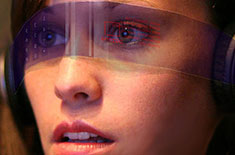Studying Policy Behind Augmented Reality
November 5, 2015

Augmented reality is the enhancement of human perception through overlaying technologies that can expand, annotate and even record the user’s moment-to-moment experience.
Those designing coming augmented reality systems should make them adaptable to change, resistant to hacking and responsive to the needs of diverse users, according to a white paper by an interdisciplinary group of researchers at the University of Washington’s Tech Policy Lab.
Though still in its relative infancy, augmented reality promises systems that can aid people with mobility or other limitations, providing real-time information about their immediate environment as well as hands-free obstacle avoidance, language translation, instruction and much more. From enhanced eyewear like Google Glass to Microsoft’s wearable HoloLens system, tech, gaming and advertisement industries are already investing in and deploying augmented reality devices and systems.
But augmented reality will also bring challenges for law, public policy and privacy, especially pertaining to how information is collected and displayed. Issues regarding surveillance and privacy, free speech, safety, intellectual property and distraction — as well as potential discrimination — are bound to follow.
The Tech Policy Lab brings together faculty and students from the School of Law, Information School and Computer Science & Engineering Department and other campus units to think through issues of technology policy. “Augmented Reality: A Technology and Policy Primer” is the lab’s first official white paper aimed at a policy audience. The paper is based in part on research presented at the 2015 International Joint Conference on Pervasive and Ubiquitous Computing, or UbiComp conference.
Ryan Calo, assistant professor of law and Tech Policy Lab co-director, is lead author together with Batya Friedman of the Information School and Tadayoshi Kohno and Franziska Roesner of computer science and engineering. Other co-authors are Emily McReynolds, UW Tech Policy Lab associate director; Tamara Denning, who graduated from the UW in computer science and engineering and is now an assistant professor at the University of Utah; Bryce Newell, who graduated from the UW Information School and is now a postdoctoral researcher the University of Tilburg; Information School doctoral student Lassana Magassa and School of Law alumnus Jesse Woo.
Read more from UW TDOAY.